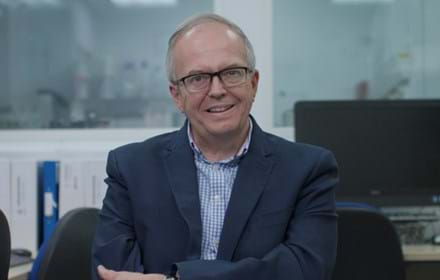
'Stoptober': Kick the habit - tips to stop smoking for good
With the annual Stoptober campaign approaching next month (October), Jill Wilson, Stop Smoking Adviser for Quit4Life, the Hampshire NHS Stop Smoking Service, offers some tips on how to kick the habit and improve health.
There are now more ways than ever to get effective help to stop smoking – a critical step towards diabetes control.
The message is clear: the benefits of quitting are well worth it - so keep trying! Here we tell you why and how.
"I thought it would be hard but my Quit4Life adviser was absolutely brilliant. I don't need cigarettes now and my life has really improved." - a Quit4Life client
Why quit?
Everyone risks damaging their health through smoking a cigarette, pipe or cigar, but if you have diabetes the risks are even greater.
You will know that you are already at greater risk of developing certain diseases. If you smoke as well, these risks become higher. The good news is that quitting smoking is something within your power to achieve - although you may need some outside help!
If you have type 1 or type 2 diabetes and you quit smoking you reduce the risk of serious health complications, including:
- Heart and kidney disease
- Poor blood flow in the legs and feet that can lead to infections, ulcers, and possible amputation
- Retinopathy (an eye disease that can cause blindness)
- Peripheral neuropathy (damaged nerves to the arms and legs that causes numbness, pain, weakness, and poor coordination)
The health benefits of quitting begin right away. People with diabetes who quit have better control of their blood sugar and studies have shown that insulin can start to become more effective at lowering blood sugar levels eight weeks after a smoker quits.
No matter what type of diabetes you have, quitting smoking will make your diabetes easier to control.

Kick the habit!
How to quit
Most smokers would like to quit but are either too afraid to try, have tried in the past and not managed it or have quit for a while and gone back to smoking.
Some have avoided trying to quit because of other concerns, such as putting on weight. Whichever of these applies, you will always stand a better chance of quitting for good if you get help from your local NHS Stop Smoking Service.

"My adviser has been very supportive... and I would recommend this service to anyone planning on quitting.Thank you." – a typical comment from a Quit4Life client
How does help from an NHS Stop Smoking Service make a difference?
1. A choice of settings
In the past many services only offered group treatment programmes, with pre-set quit dates and a rigid weekly session format. Whilst these achieved excellent success rates, they did not suit everyone and most services now offer a range of options - all still run by trained stop smoking advisers - making it easier to find a setting you feel comfortable with.
These include:
- Informal drop-in clinics held e.g. in community centres, village halls or even pubs
- One-to-one appointments at pharmacies and GP surgeries
- Telephone support for those unable to attend regular sessions
- Workplace programmes arranged between the employer and NHS Stop Smoking Service
- Specialist groups
2. Advisers
Your dedicated adviser to provide weekly support and encouragement - without lectures or nagging!
These may be dedicated full-time stop smoking specialists or, e.g., healthcare workers or pharmacists who have been trained to provide support. They will go out of their way to build a rapport with you and boost confidence, whilst offering practical advice that can really make a difference.

3. Preparing for your quit date
Help to prepare for an agreed quit date, identify triggers and plan coping strategies
The importance of this should not be underestimated and the adviser will ensure everything is in place before a quit attempt is made - helping you identify triggers, plan coping strategies, rewards, etc.
4. Product choice
Information and advice to choose products to help you quit that will suit you best. This could include consideration of e-cigarettes
There is no "best" product but there is no doubt that different products suit different people. Again the adviser will go through the options carefully to help you choose the product or products that are most likely to be helpful. If you have tried Nicotine Replacement Therapy (NRT) such as patches without success it does not necessarily mean they will not work for you.
Evidence has shown that two products used together can be effective when one was not. For example, a patch gives a good constant flow of nicotine, then at particularly challenging times, such as during stress or social events, topping up with a secondary oral product like the mouth spray can prevent that little slip that quickly leads to full scale relapse!
Your adviser will also go through other options, such as the stop smoking drugs Champix and Zyban. If you have been using an e-cigarette to cut down, or are thinking of using one as a tool to help you quit, it is a good idea to talk this through with your adviser before making a final decision.
5. Cost of products
Licensed products are supplied free or at reduced cost, compared with buying over-the-counter products
How products are supplied does vary from one service to another. Some offer them at the session for a one-off prescription charge, others via prescription request or voucher.
Whichever way, it will work out a lot cheaper than buying them over the counter - and of course much cheaper in the long run than smoking!

6. Carbon monoxide readings
Watching your carbon monoxide (CO) levels reduce after quitting
Carbon monoxide (CO) is an odourless, tasteless, poisonous gas that you breathe in when you smoke. It reduces efficiency in breathing and makes blood more sticky, increasing the risk of coronary heart disease (CHD) and other circulation problems. Your adviser will measure your reading (in parts per million in your breath) using a simple breath monitor while you are still a smoker.
The more you have inhaled from smoking in the last few hours the higher it will be. The good news is that it quickly goes down to a non-smoker level within two days of quitting - a terrific motivation to stay smoke free.
7. Weight gain
Help to address concerns such as putting on weight
This is a very understandable concern, particularly for people with diabetes. Your adviser will work with you to minimise the risk of putting on weight when you quit and to reassure you that the extra energy you gain from quitting will in the long term increase your capacity for enjoyable exercise. Some services have even negotiated special deals for successful quitters, e.g. free sessions at local pools and leisure centres.
8. Repeat attempts
A flexible treatment that encourages repeat attempts if necessary
If you have tried to quit in the past and not managed it - or if you have quit for a time and gone back to smoking - you will always be welcomed back for another try as soon as you feel ready (in the past there may have been a time you had to wait). You will have gained valuable experience from previous attempts which will make the next attempt much more likely to succeed. You will be reassured that it is never too late to quit, there will always be a benefit to your health and you can do it with the right help.
The biggest hurdle may be that first contact with your local Stop Smoking Service. But we don't bite, honestly!
More information
To find your local NHS Stop Smoking Service visit: www.nhs.uk/smokefree or call 0300 123 1044.
Read 10 health benefits of stopping smoking here
Stoptober campaign
Search ‘Stoptober’ online to sign up for the Stoptober challenge.
The Department of Health Stoptober campaign encourages people across the country to stop smoking together on the 1st October for 28 days (and beyond). Stop smoking for 28 days and you are five times more likely to stop for good.
There are lots of free support tools from apps to packs - we have all the help you need.
About the author
Jill Wilson has been a stop smoking adviser in Hampshire since 2002. She has helped adapt the local NHS service over the years to meet the changing needs of the population. Quit4Life, the Hampshire NHS stop smoking service, has been awarded Approved Provider Status by the NCSCT (National Centre for Smoking Cessation and Training) and achieved nearly 4,000 successful four-week quits in the year to end March 2015. This figure includes more than 1,000 patients with at least one long-term condition, such as diabetes.
The above is a sample article from a recent Diabetes Wellness News – it was originally published in the September 2015 issue of Diabetes Wellness News (reviewed within 18 months from publication date). Source references are available on request.
I would like to make a regular donation of
I would like to make a single donation of
There are lots of ways to raise money to support
people living with all forms of diabetes.
Bake, Swim, Cycle, Fly ... Do It For DRWF!
Fundraise with us
Recent News


